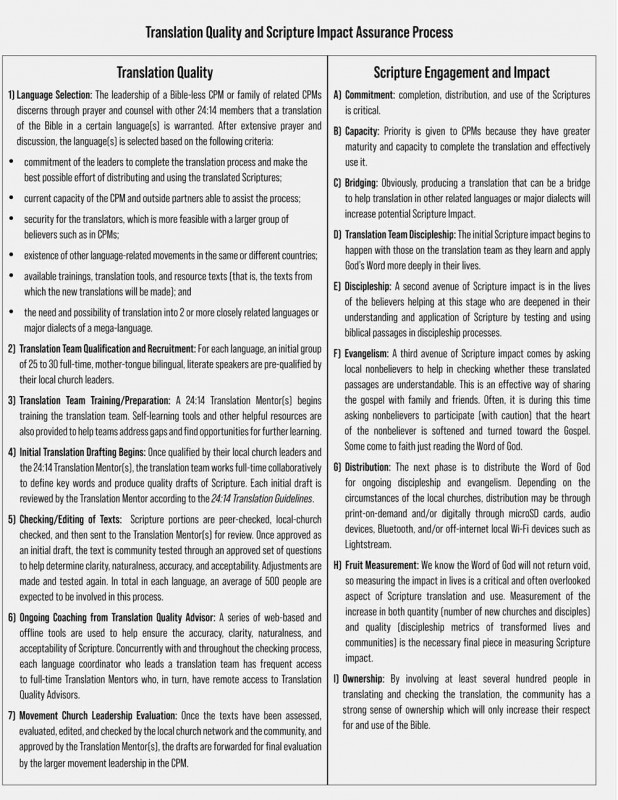May 01, 2023 by Stan Parks, Ph.D.
Translation Quality and Scripture Impact for “Last Mile” BibleTranslations
24:14 Goal: Movement engagements in every unreached people and place by 2025 (32 months)

All people deserve to have the Word of God in their heart language. Today, we are closer than ever before to seeing the Bible translated into every language, but key barriers remain. Over 20% of the world is still waiting for the Bible in their heart language (6,600+ languages).
“Last mile” is used to describe the short final segment of delivery of services or items to customers. Last mile logistics are usually the most complicated and expensive aspects of completing the service or delivery. This same dynamic occurs in completing the task of translating the Bible into every language.
Why do so many last mile languages remain Bible-less? One reason is that many of them are spoken mainly in areas hostile to the Gospel. In the past—and even until recently—translation teams often located in a place and worked together there for years. Today, however, outside translators seeking to do translation in politically restricted and/ or hostile regions often cannot even gain access to these areas. Translators who do have access are often faced with working in secret, moving from one location to another, and keeping their work hidden from friends, family, and the community. Often, due to death threats and persecution, translators wait until the work is completed to disclose it, covertly taking the finished product to partners to print and share with others. In recent years, numerous kidnappings and/or killings of translators in these types of areas have been reported.
One challenge faced in these circumstances is ensuring the translators receive the mentoring, assistance, and funding they need. However, traditional patterns of translation assistance and measurement are neither practical nor possible. Those of us assisting from the outside must adjust to the new realities. We need to recognize that these men and women risking their lives deserve our best efforts and servant-hearted support instead of asking them to fit into our previous patterns and paradigms of translation.
At the same time, nobody involved wants a haphazard and poor-quality translation of the Word of God. How then can we assure quality and accountability for the outside supporters while not endangering the lives of those who are at the last mile, translating in these restricted areas?
The RUN1 family of Church Planting Movements (CPMs)2 has pioneered a method that has produced quality translations while also giving the measurements and outcomes that meet the needs of outside supporters. RUN is part of the 24:14 coalition of CPMs and CPM advocates, which represent 1,983+ CPMs and 114+ million disciples in these movements.3 Leaders of 24:14 have studied and endorsed this translation process and are actively working to help other CPMs follow this model. The Translation Quality and Scripture Impact Assurance Process for hostile areas is:

In conclusion, many of the languages included in the last mile in Bible translation involve some difficulties and dangers that we cannot overcome with the traditional translation processes that God has used so effectively in the past and continues to use today. The inability of outside translators to gain access and the persecution and dangers faced from opponents of the Gospel mean that the Bible will not be translated into these languages unless we find new pathways.
It is exactly these high-persecution areas that most desperately need the Bible in their own language. Church history tells us that the Bible in a heart language is not necessary for initial evangelism and discipleship. However, the Bible in a heart language is one crucial factor for surviving and enduring persecution. One example is the long-standing survival of the church in Egypt and Ethiopia compared to the rapid demise of the church in North Africa after the assault of Islam. A primary reason for this is that Egypt and Ethiopia had the Bible in local languages, while the church of North Africa had the Bible in Latin, spoken only by the elites.
God is not surprised by these challenges. God in His wisdom has used existing trade language Bible translations to begin multiplying disciples and churches in many of these last mile Bible-less languages. Disciples are positioned inside these language communities and are willing to face life-threatening risks in translation because they deeply yearn to provide the Bible to both the believers and the lost in their own heart language. Additionally, God has allowed us to live in a day when we can strengthen and support those who risk so much by training and using the latest technological breakthroughs for translation.
As has been seen above, this seven-step translation process not only assures a quality translation but also assures scriptural impact during and after the translation process. As we observe how the Holy Spirit has already used this process, we can trust and work and pray to see many more translations done, until in our generation there are no more Bible-less languages. God is giving us the opportunity to see the world full of His glory, but it is a day that challenges us to trust and rely on Him as never before!











comments